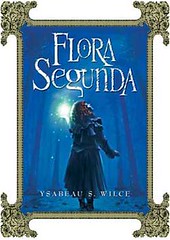At the Anderson Bookshop kidlit breakfast the other day I got into a conversation with several people about books that end on cliffhangers, thus forcing the reader to wait for the next volume to find out the end of the story. My fellow conversationalists seem to all agree that this was not a good thing.
Why do writers do that? one asked me somewhat plaintively. Can't they see how awful it is for a reader, particularly a kid, to plow all the way through a book only to have to wait to find out how the story ends?
The only immediate answer I had was that I'm not sure it's the always the writer who makes that decision, and of course, both writers and publishers want people to buy books so anything they can do to make the reader want more may seem like a good idea to them. Particularly if the book is part of a series.
Flora Segunda is part of a series, of course--well, I know it doesn't say that anywhere on the book itself, but it is part of a series--but each book has a self-contained plot. Of course, each book will have unresolved issues in it that will carry to the next volume. There might be an extra little oomph in the last few pages that might just set up a plot in the next book, but the story you've just spent all that time reading will wrap up. I promise.
Readers invest a lot of time in your book, and money too. You owe it to them not to string them along. I also find it extremely annoying to race to the ending of a book only to find there is no ending--to be continued is the only resolution, and obviously that's not a real resolution at all. Not only is it annoying, it's unfair too. (Particularly when the next volume might not be out for months.)
In fact, that very thing happened to me last night. I stayed up late, rapidly turning pages, trying to finish an extremely absorbing really terrific book (which shall remain nameless) because I just had to know how it ended, only to get to the last page and--WAH!--there was no ending. The book stopped at a most climatic and cliffhanging point.
Booooooo...
I was so annoyed I almost threw the novel across the room. And I felt a little betrayed too, like the author had tricked me into reading three hundred pages--for nothing.
Does writers think this is a good idea--alienating their audiences? Do the publishers think it's a good idea--to make the reader come back for more? Obviously someone thinks it is a good idea or it wouldn't be done at all.
I wish that someone would think again.
Tuesday, February 13, 2007
Subscribe to:
Post Comments (Atom)











2 comments:
I second, third, fourth and fifth you on this one! My suspicion is that it must be the publishers' idea most of the time, wanting to avoid scaring off readers with massive tomes (I LOVE massive tomes!) and stringing them along. But then, there may be writers who're writing to contract who don't actually have the complete work finished but need to get the series started. I dunno. Flora got it right. It "ended" but left me wanting more.
Actually, you may be right that publishers don't like the idea of looong books. I seem to recall reading somewhere that LOTR was supposed to be one volume, but the publisher took one look at the length and blenched. It was split into three volumes, which is why the first two books end at rather arbitrary points. I've personally known at least one other author who had ONE long book which the pub. wanted to split into THREE books. This required padding in the middle. And of course "omnibus" editions were popular in the 19th century--and they were all about trying to squeeze extra money out of the readers...so it's not a new trend. But I stand by my assertion it is an annoying trend.
Post a Comment